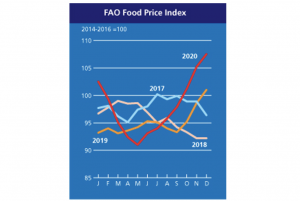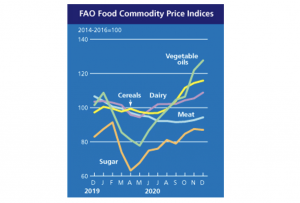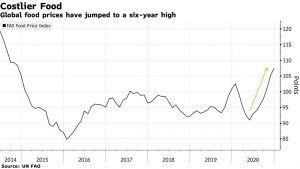As a result of the attack on Iran, nitrogen fertilizer at the port of New Orleans has seen an increase in price this week. Urea prices for barges in New…
FAO Food Price Index Reaches Six-Year High, But Below 2011 Peak
Reuters News reported last week that, “World food prices rose for a seventh consecutive month in December, with all the major categories, barring sugar, posting gains last month, the United Nations food agency said on Thursday.

“The Food and Agriculture Organization’s food price index, which measures monthly changes for a basket of cereals, oilseeds, dairy products, meat and sugar, averaged 107.5 points last month versus 105.2 in November.”
For the whole of 2020, the benchmark index averaged 97.9 points, a three-year high and a 3.1% increase from 2019. It was still down more than 25% from its historical peak in 2011.
The Reuters article noted that, “Vegetable oil prices continued recent strong gains, jumping 4.7% month-on-month in December after surging more than 14.0% in November. For the whole of 2020, the index was up 19.1% on 2019.”

More narrowly regarding cereals, the FAO stated that, “The FAO Cereal Price Index averaged 115.7 points in December, up 1.3 points (1.1 percent) from November, marking the sixth consecutive monthly rise. Wheat export prices rose further in December, reflecting tightening supplies among major exporters, concerns over growing conditions in parts of the United States of America and the Russian Federation as well as expectations of lower than-earlier-anticipated wheat shipments from the Russian Federation following its announcement of an export tax/quota. Among coarse grains, sorghum prices rose sharply in December, as sales from the United States of America, mostly to China, remained robust. Maize export prices moved higher, sustained by continued concerns over crop prospects in South America, with a spillover from sharp increases in soybean prices adding further support.”
And Bloomberg writers Agnieszka de Sousa and Megan Durisin reported last week that, “Global food prices reached a six-year high in December and are likely to keep rising into 2021, adding to pressure on household budgets while hunger surges around the world.

“A United Nations gauge of food prices has jumped 18% since May, as adverse weather, government measures to safeguard supplies and robust demand helped fuel rallies across agricultural commodities from grains to palm oil. Prices will likely climb further, the UN’s Food & Agriculture Organization said.”
The Bloomberg writers pointed out that, “Corn and soy futures rallied to six-year highs as drought threatens crops in South America at a time of surging Chinese demand, while palm oil — used in about half of all supermarket goods — is near a 10-year high. Protectionist measures are also propping up markets, with Argentinian farmers planning a protest strike after the government suspended corn-export licenses, while wheat giant Russia will curb grain exports from mid-February to tame food inflation.”





